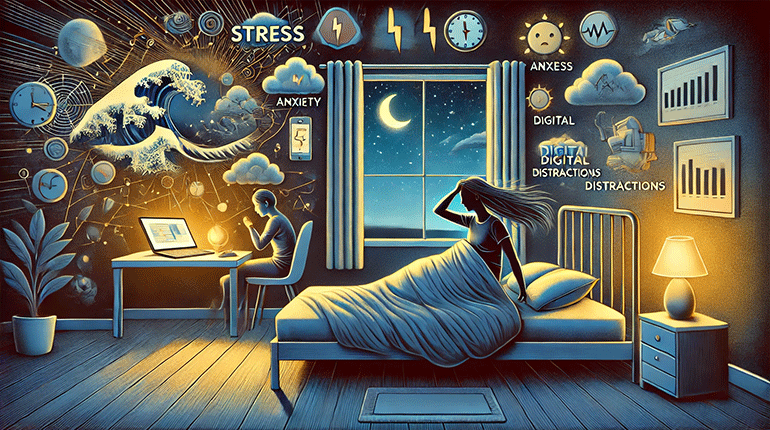Sleep and Mental Health: Why Britain is Struggling to Get a Good Night’s Rest
In modern Britain, sleep deprivation is emerging as a major public health issue. Despite growing awareness of the importance of sleep, many struggle to achieve restful nights, leading to a cascade of negative effects on mental health. This article delves into the causes, consequences, and solutions to the UK’s sleeplessness crisis.
1. Understanding the Sleep-Mental Health Link
Sleep and mental health share a complex, bidirectional relationship. Sleep supports brain processes crucial for regulating mood, memory, and stress response, while poor sleep exacerbates mental health challenges.
Mood Regulation: Sleep stabilizes emotions and reduces irritability, enabling better responses to stress.
Cognitive Function: A good night’s sleep sharpens focus, memory, and problem-solving abilities.
Stress Management: Quality sleep lowers cortisol, the stress hormone, providing mental calm.
Conversely, poor sleep increases the risk of anxiety, depression, and even severe conditions like psychosis. These issues, in turn, can further disrupt sleep, creating a vicious cycle.
2. Causes of Sleep Deprivation in Britain
Several interrelated factors contribute to the UK’s widespread sleep difficulties.
a. Digital Distractions
Smartphones, tablets, and laptops emit blue light, which disrupts melatonin production, making it harder to fall asleep. Social media, streaming services, and 24/7 news cycles encourage late-night screen use, delaying sleep.
b. Stress and Anxiety
Economic uncertainties, workplace pressures, and personal challenges leave many Britons lying awake, replaying their worries. Studies show a significant rise in sleep disturbances linked to pandemic-related anxiety.
c. Irregular Schedules
Modern work patterns, including shift work and flexible hours, often clash with natural circadian rhythms, leading to inconsistent sleep.
d. Environmental Factors
Urban environments, marked by light pollution, noise, and insufficient green spaces, create physical barriers to restful sleep, particularly in large cities like London and Manchester.
e. Health Issues
Sleep disorders such as insomnia, sleep apnea, and restless leg syndrome often coexist with mental health conditions, creating a compounded challenge for sufferers.
3. Impact on Mental Health
Sleep deprivation’s mental health consequences are profound and far-reaching.
Anxiety and Depression: Persistent sleep issues increase the risk of developing anxiety disorders and major depressive episodes.
Psychosis and Hallucinations: Severe sleep deprivation has been linked to psychotic symptoms, including hallucinations and paranoia.
Suicidal Ideation: Insomnia significantly heightens the risk of suicidal thoughts, particularly in young adults and those with pre-existing conditions.
Cognitive Impairment: Lack of sleep dulls decision-making, problem-solving, and the ability to handle stress effectively.
4. Initiatives to Combat the Crisis
Efforts are underway across the UK to address sleep deprivation and its mental health implications.
a. NHS Interventions
The NHS offers Cognitive Behavioral Therapy for Insomnia (CBT-I), a proven treatment that addresses negative thought patterns about sleep. GP services also recognize and treat sleep disorders as part of overall mental health care.
b. Sleep Awareness Campaigns
Public health organizations promote sleep hygiene through education campaigns, encouraging habits such as regular sleep schedules and screen-free evenings.
c. Workplace Wellness Programs
Progressive employers are introducing wellness initiatives that include flexible hours, mindfulness sessions, and resources to combat workplace stress.
d. Sleep-Tracking Technology
Apps like Sleepio and wearable devices help individuals monitor their sleep patterns, offering personalized advice to improve sleep quality.
5. Practical Tips for Better Sleep
For individuals struggling to get enough rest, these strategies can make a significant difference:
Stick to a Schedule: Aim to sleep and wake at the same time every day, even on weekends.
Create a Relaxing Routine: Wind down with calming activities like reading or meditating before bed.
Limit Screen Time: Avoid electronic devices for at least an hour before bedtime to reduce blue light exposure.
Optimize Your Sleep Environment: Keep the bedroom dark, quiet, and cool for maximum comfort.
Reduce Stimulants: Limit caffeine and nicotine, especially in the late afternoon and evening.
6. Addressing the Bigger Picture
Solving Britain’s sleep crisis requires a collective effort. Public awareness campaigns can educate people about sleep’s importance, while government policies can encourage healthier work-life balances. Employers can play a key role by fostering cultures that prioritize mental and physical well-being.

